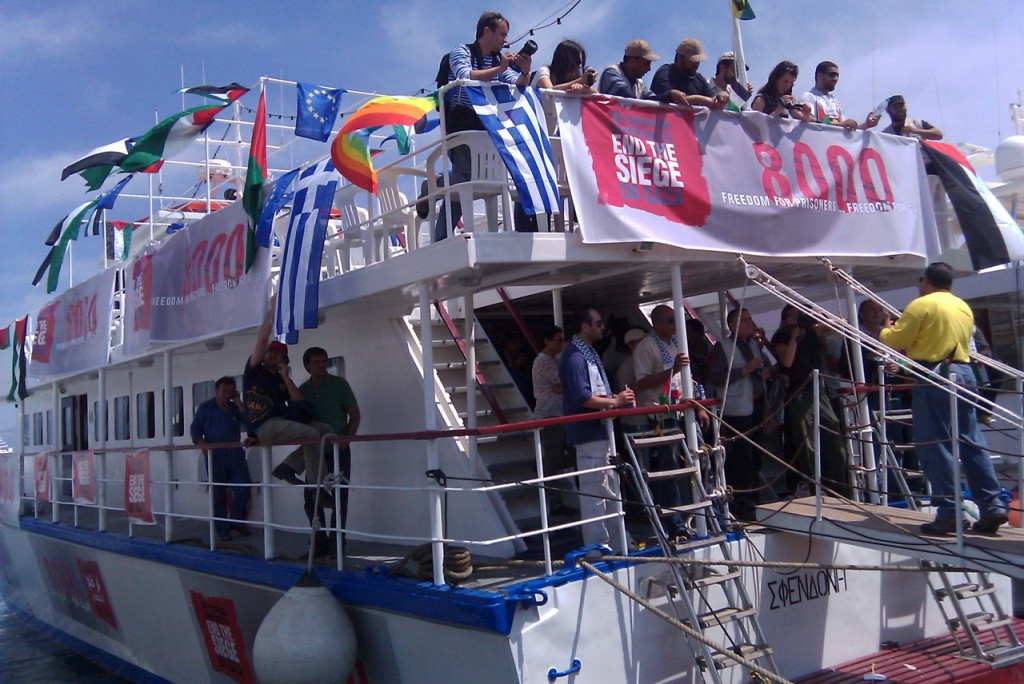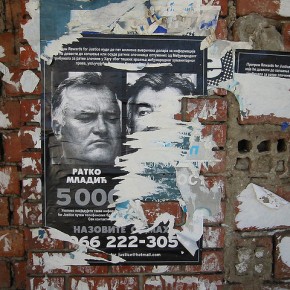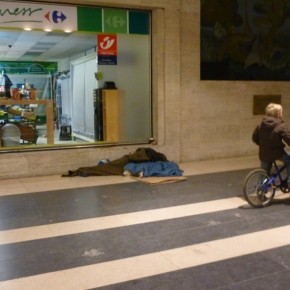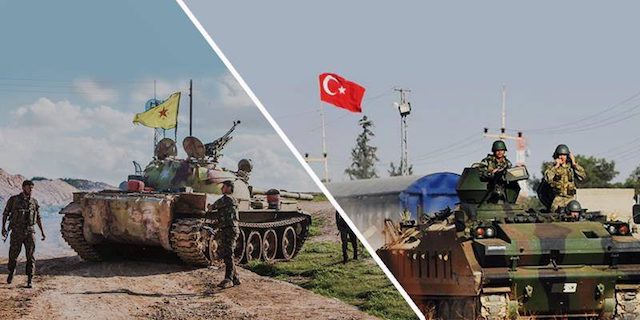Gene St. Onge is not the sort of person you would expect to have done time in an Israeli prison. A middle-aged engineer from Oakland, California, there is a reserved aura about him that seems entirely suited to St. Onge’s hometown and choice of profession.
Introduced to me by a friend who works with Berkeley’s Beyt Tikkun congregation, the gray-haired Lebanese American informed me that he took part in the Gaza Freedom Flotilla last year, in which Israeli naval forces killed nine Turkish activists.
Flotilla participants were often characterized as radical activists. Gene didn’t fit this stereotype. Like many Americans who have become politicized by the Arab-Israeli conflict, he was a regular guy who took a chance for a cause he believed in.
A longtime Mideast peace advocate, Gene St. Onge was on the boat Sfendoni that, like the others, was seized in international waters. I asked to interview him for a one-year retrospective on the flotilla killings.
I wanted to know what drew him to the flotilla, and what his experience had been like being on the wrong side of the Israeli government as a US citizen. As we spoke, Gene became more spirited and a punchy Boston accent came out.
You were steering the Sfendoni when the Israeli Navy first made contact. Can you describe that exchange?
Gene: There’s this fellow with this thick accent speaking English. [Israeli accent] “Israeli Navy, Israeli Navy contacting Sfendoni.” Then they started asking questions. This is consistent with maritime law. They had every right to know who we were and where we came from. Which the captain shared with them.
Then they started asking more and more questions. It went from basic information to an investigation. At that point, the captain said, “Enough.”
What they said during this back and forth was [Israeli accent], “You are violating our security zone. You must turn around and leave.” This was the first thing they said. “You must go back.” Later they said, “You know, if — we will do everything to stop you and if there’s damage or injury, it will be the responsibility of the captain.” The captain asked, “Okay, so what are the coordinates of your ‘security zone?’”
No answer. And we asked them again. No answer.
It was clear that the security zone was what they decided it would be. At that point we were about fifty miles or so away from shore. I think we were at thirty-something when we were attacked. We were still in international waters.
Some international law experts will argue that there is an exception when there is an actual war in that area. But that’s nonsense. There’s no Gazan Navy. They don’t have sea battles. They don’t let them go beyond three kilometers from the Gaza shore. The whole idea of there being an actual battle out there, or potential battles, was utter nonsense. It was an excuse.
You asked about the security zone and they didn’t respond. That was the last communication before they attacked you?
Gene: That was the last I heard about it until, later on, (when) we were dragged into the port of Ashdod, and they had this little tent city set up for processing us. The first person I was interviewed by, I asked, “What are you charging us with?” He said, “You’ve violated Israeli law. You violated our security zone.” [Laughing] I asked, “What law is that? I kept pressing. “Where’s the law? I have a lawyer here who we’re going to contact.”
Finally, (the Israeli official) said, “There is no law.” He actually said that. Just as he was getting up to leave, when I was done. It was like, “Alright, get outta here, there’s no law.”
Other people on boats that were seized were told that they violated Israeli law by illegally entering Israel. Think about that. They had the temerity to say something like that. Like, “We can say anything we want. Even something as silly as that. Whaddya gonna do about it?” [Laughing]
Around 4 AM, the commandos arrived on inflatable Zodiac boats, in full battle gear. Activists surrounded the wheelhouse. Had you trained to resist arrest?
Gene: In the best of circumstances, we would surround the wheelhouse and delay things, long enough to be able to get to shore. Of course, we were thirty-something miles away so that wasn’t going to happen. It really became just a form of resistance. “We’re not acceding to this. You’re in violation of the law. We’re not submitting to your power.” It was a way of saying that.
There was a Plan A and a Plan B. We wanted to believe that the Plan A would work, that we’d go right through. We assumed they would threaten us — that was part of both plans — but even as they threatened us, many of us still thought that there is a good chance that we were going to get through.
They took you to Ela Prison, in Be’ersheva. Security officials began interrogating you about links between you and terrorists organizations like Al Qaeda and Hamas. Do you think that they actually believed you were connected to those groups?
Gene: I’ve thought about that. Even while I was there, I wondered, “Could they be that stupid?”
But the more I think about it, and the more I try to understand the psyche behind all this, the more I feel that, maybe not at the higher echelons, but among the general military and prison officials, that a lot of them have been trained to believe that we’re all terrorists, or potential terrorists, or terrorist-sympathizers.
Not that long before we set out, the Re’ut Institute labeled us an existential threat to the country. All left-wing activists in general.
Political activists challenging Israel’s treatment of the Palestinians represented an existential threat. I mean, we were right up there with Iran. And still are.
Since then, they’ve been treating activists more harshly. Even if these army personnel didn’t see us as having direct links [to terrorist organizations], we’re part of the enemy. I don’t know if they individually thought, “Well, this is an exercise in futility,” or whether some of them thought, “I just might catch the one that snuck by.”
There was some communication, particularly in Turkey, with Hamas, but no direct links.
The IHH, you mean?
Gene: Yeah. There was a meeting before the flotilla between IHH and Hamas officials. Hamas gave their blessing to it. But you’re really looking more at a guilt-by-association than any kind of formal tie. Israel tried to get this country [the United States] to put the IHH on its terrorist list. The State Department said no. If they had a close relationship with Hamas, which (according to) our government is a terrorist organization, the IHH would have been on that terrorist list too. They aren’t. That says a lot right there.
How were you treated inside the prison? Did they treat American citizens and the Turks and the Arabs differently?
Gene: It wasn’t even so much the American citizens. I would categorize them as the internationals. The white guys. I hate to say it but people like me — the Americans, the Europeans — were abused in a different way. We were psychologically abused. We weren’t physically abused, unless we stepped out of line.
Then, in the hierarchy were the people of color, the Turks, in particular. The Muslims. It’s an Ashkenazi hegemony in Israel. Even Israelis of color have problems. So they treated the Turks badly. There were more than just the killings. The (Israelis) physically abused them. They got shoved around. They got hit. They were beaten in prison.
It’s also true that the Turks resisted. They shot water cannons. I remember seeing off in the distance the Turks shooting these powerful fire hoses onto the commandos that were trying to scale the side of the boat (the Mavi Marmara). In retrospect, it might have been better to let them board that way.
I know that one of the top commanders has recently said that there was no way (Israeli forces) could have non-violently taken over the Mavi Marmara. I think at some point they were prepared to shoot people. When they resisted with the fire hoses, the Israelis decided to come in by air. We know now that even before the commandos descended, they were shooting down on the deck. Live fire. They killed two or three people before they even landed.
Right. “Premeditated violence.”
Gene: If you understand that they were being shot at, that their friends had already been wounded and killed by the time the Israelis landed, what would you expect them to do? Even then, apparently, they exercised a lot of restraint. There was a Turkish doctor, at least one or two, that gave aid to the injured commando. We have pictures of that but they never got shown.
US diplomat Sue Plott came the second day you were in jail. She gave you a bunch of forms to fill out.
Gene: I went up to her and I said, “I’m sorry but with all due respect, I feel more like I’m at the DMV than I’m talking to a representative of my country.”
We were pressing her. “You understand, we were pirated. They captured us. They dragged us to prison. It was all against our will. Don’t you understand that? Aren’t you going to do or say something about that?” The first thing she said was, “I’m not an international law expert. I don’t know international maritime law so I’m not qualified to comment on it.”
What was Plott doing if she wasn’t there to help you?
Gene: Her goal was just to go through the steps that are required of the State Department. She went through the show of coming and filling out all the documents that get sent to the State Department and probably got filed in a drawer or thrown away immediately. Because they never did anything. The State Department never formally challenged Israel on any of this.
Remember, one of the Turks killed was a US citizen. He was born here. A young fellah, nineteen years old. His father was a professor in upstate New York, I think, when the he was born. The father has asked many times, ‘Where’s the investigation? One of your citizens was killed and you’re refusing to investigate?’
Clearly the government was embarrassed. They were cornered. They didn’t want to say anything. They didn’t want to do anything. They didn’t want to have anything to do with it.
When you came back, you were interrogated by US Customs for eight hours.
Gene: In Chicago. We’re on a watch list. We had been imprisoned by one of America’s allies.
You were under suspicion of being a terrorist.
Gene: Yeah. I had lists of all of the ( Freedom Flotilla) people because I wanted to be able to stay in touch. The Customs person checked everyone of those contacts to see if there was some terrorist link.
There weren’t any charges filed against you. But you could have been tried under the Patriot Act.
Gene: When we got back, the silence [from the government] was deafening. Like I said, they didn’t want to have anything to do with us. Not even Barbara Lee. I had to threaten to go to the media to have our day with her in her office here. I called Lee’s mentor and I said, “I haven’t heard from her – the (Oakland) Congresswoman needs to know that I still have access to media.” That was the afternoon. First thing the next morning, Lee called me personally. She’s never done that before. Then we had our meeting.
In all fairness, this is a State Department issue. Lee is not State Department. She said she would tell us what we needed to do, and help us with any paperwork. I didn’t want to waste my time. Because they sent us a form, about twenty pages or something.
For what?
Gene: Explaining everything. What we lost – because they stole everything we had. The (Israelis) never gave anything of value back to anybody. As far as I know, they never gave any of the other four boats back either. We had claims. Claims of mistreatment, claims of theft. At that point, I knew enough. I knew the futility of it. I said, “Thanks but no thanks. I’m not going to waste my time.”
How were you impacted by the Patriot Act?
Gene: There were a dozen Congresspeople threatening to charge us under it, saying we had indirectly assisted a terrorist organization, Hamas, by buying and bringing goods in.
But you’re never been charged with anything.
Gene: I know this sounds cynical, but I don’t believe it’s because they don’t think they have a case. The Supreme Court has already told them they do. I think it’s because (the US government) don’t want to give us a forum to speak out.
Has the experience changed how you look at the occupation?
Gene: It didn’t so much change [it] as it brought it into sharper focus. Whatever feelings I had were magnified. I was very angry at Israel for a long time, because of how I was mistreated. I came away in kind of a bad way. I’m not sure I could have put up with such treatment a whole lot longer.
What kind of things did the Israeli authorities do to you?
Gene: They denied us food. They denied us sleep. They would keep us awake at night with loud speakers blasting messages in Hebrew.
They would tell us certain things would happen that wouldn’t happen. When we got to Ashdod, they told us that our representative would be on the shore to meet us. They weren’t.
They lied to us over and over again. I began to realize that they were trying to break us down.
Say more about the interrogations.
Gene: At some point, I think (the security officials ) realized it was a waste of time. But they kept doing this, even the interrogations, because I think it was a form of collective punishment. People need to be prepared for that. A lot of the others were better prepared than I was because they had been through it before. Most of the other Arabs had been through rough times with the Israelis, in one form or another.
Did the experience change how you view activism?
Gene: Yes. I don’t have a hundred-percent clear picture of what’s really effective. This was effective, but how much was that because nine people died? We came to a consensus that if they hadn’t died, if [the IDF] had somehow done this non-violently, it would have been a story but it wouldn’t have been a big story. But because of what happened, it changed perceptions of Israel. (The notion) that Israel is a defenseless victim pretty much died after that.
One of the questions I get is, ‘Why are you interested in this? Why don’t you know care about, Darfur and everything else?’ I do care about those things, but I don’t have a passion for them. I love baseball. I love football, but it’s not like I learned to love it! I have Arab blood. I imagine that has something to do with it. But I hope it doesn’t have very much to do with it.
Do you think it makes it easier to identify with Palestinians?
Gene: Yes and no. I’m an Arab who doesn’t speak Arabic. So that’s embarrassing. In some ways it would be easier if I wasn’t [Arab].






What’s frightening in this account is not so much the treatment meted out to these activists by Israel. A paranoid state can behave in even worse ways when it feels itself threatened. It is the callous treatment those who happened to be US citizens received from their country’s government.